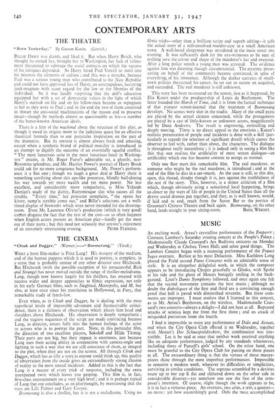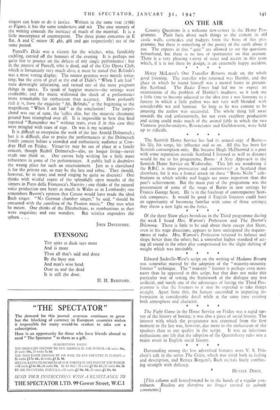MUSIC
AN exciting week. Arrau's crystalline performance of the Emperor ; Constant Lambert's Saturday evening concert at thc People's Palace ; Mademoiselle Claude Crussard's Ars Rediviva concerts on Monday and Wednesday at Chelsea Town Hall; and other good things. The Lambert Concert began with a stunning performance of the Francs 7uges overture. Berlioz at his most Delacroix. Miss Kathleen Long played the Field second Piano Concerto with an admirable sense of style. It is an altogether delightful work, in which the composer appears to be introducing Chopin gracefully to Glinka, with Spohr at his side and the ghost of Mozart benignly smiling in the back- ground. Liszt's Dante Symphony followed, and once again one felt that the second movement contains the best music ; although no doubt the diaboliques of the first and third are a convincing enough proof that hell is paved with diminished sevenths. But these com- ments are improper. I must confess that I listened to this concert, as to Mr. Arrau's Beethoven, on the wireless. Mademoiselle Crus- sard's two concerts—always a delight—I did not hear at all. Repeated attacks of sciatica kept me from the first three ; and an attack of misguided patriotism from the fourth.
I find it impossible to resist any performance of Dido and Aeneas, and when the City Opera Club offered it on Wednesday, together with Mozart's Der Schauspieldirektor, the combination was irre- sistible. Let it be said at once that neither work received anything like an adequate performance, judged by any standards whatsoever, including those of Purcell's girls' school. On the other hand, one must be grateful to the City Opera Club for putting on these pieces at all. The extraordinary thing is that the virtues of these master- pieces shine through the most imperfect performances. Impossible to conceive a modern work, -whatever its difficulties or simplicities, surviving in similar conditions. The soprano scrambled by a devious route up to her top E flat and slithered down on the other side in considerable disarray—yet somehow one saw the line of the com- poser's intention. Of course, slight though the work appears to be, it is in fact a virtuoso piece. An overture, two arias, a trio, a quartet— no more: yet how astonishingly good. Only the most accomplished'
singers can hope to do it justice. Written in the same year (1786) as Figaro, it has the same tenderness and wit The easy mastery of the writing conceals the intricacy of much of the material. It is a little masterpiece of counterpoint. The three piano concertos in E flat, A and C minor (K 482, 488 and 491 respectively) are of the same period.
Purcell's Dido was a victory for the witches, who, fiendishly cackling, carried off the honours of the evening. It is perhaps not quite fair to pounce on the defects of any single performance : but in the interest of Purcell, who is dead, and of the City Opera Club, which is fortunately very much alive, it must be stated that Belinda's was a most vexing display: The rococo gestures were merely irrita- ting; but the cries of grief at the end of Dido's " When I am laid were downright infuriating, and ruined one of the most poignant things in opera. To, speak of happier matters—the settings were creditable; and the music withstood the shock of a performance more remarkable for enthusiasm than accuracy. How profusely rich it is, from the exquisite " Ah, Belinda," at the beginning to the magnificent " When I am laid " at the conclusion! The harpsi- chord was out of tune, the 'cellos also, but the majestic chromatic ground base triumphed over all. It is impossible to hear that final repeated " Remember me " without tears, even if in this case they were mingled with tears of rage. Or was it my sciatica?
It is difficult to overpraise the work of the late Arnold Dolmetsch ; but it is difficult, also to praise the performances at the Dolmetsch family concert before a crowded and enthusiastic audience at Cow- dray Hall on Friday. Virtuo:-ity may be out of place at a family concert, though Rudolf Dolmetsch—alas, no longer living—never made one think so. One cannot help wishing for a little more robustness in some of the performances. A public hall is doubtless the wrong place for such an entertainment. Just as a clavichord is for the private ear, so may be the lute and rebec. They should, however, be in tune; and need singing be quite so discreet? One thinks with wistful regret of the splendidly open mouths of the singers in Piero della Francesca's Nativity one thinks of the natural voice production one hears as much in Wales as in Lombardy; one remembers Busoni's opinion that Caruso would have made the ideal Bach singer. "No German chamber singer," he said, " should be entrusted with the cantilena of the Passion music." One sees what he meant. One thinks of the Elizabethans, as rumbustious as they were exquisite; and one wonders. But sciatica engenders the spleen. . . .
JOHN DAVENPORT.



































 Previous page
Previous page